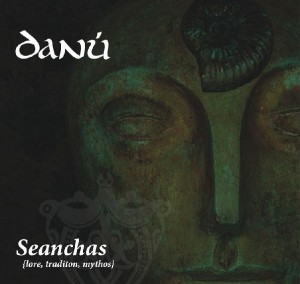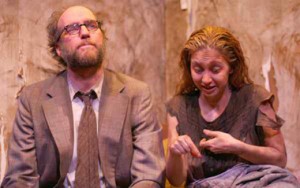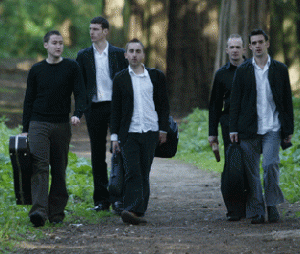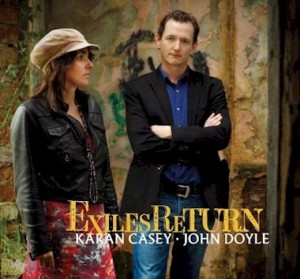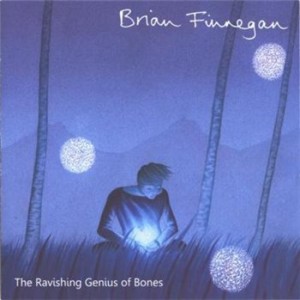 Brian Finnegan’s new solo CD is not so much a departure from his other gig—as the whistle and flute front man for the modern trad ensemble Flook—as a huge, breathtaking elaboration on many of the unique and daring themes he has explored with that band over the years.
Brian Finnegan’s new solo CD is not so much a departure from his other gig—as the whistle and flute front man for the modern trad ensemble Flook—as a huge, breathtaking elaboration on many of the unique and daring themes he has explored with that band over the years.
On “The Ravishing Genius of Bones”—an obscure reference to an accompanying poem about an old accordion player—Finnegan is joined by two of his Flook bandmates, bodhránist John Joe Kelly and Ed Boyd on guitars. You might be tempted to look upon this recording as just a variation on a theme—a kind of “Flook Not Flook.” That would be a mistake.
“The Ravishing Genius of Bones” is Finnegan’s “Lawrence of Arabia,” a musical epic with a cast of thousands. Well, maybe not thousands—but well over 20 world-class musicians representing a variety of genres. In addition to Kelly and Boyd, members of Finnegan’s other band KAN (Aidan O’Rourke on fiddle and guitarist Ian Stephenson) form part of the large, rotating cast of players, along with co-producer Leon Hunt on banjo and dobro (he’s a former student of Bela Fleck), alternative bluegrass band Crooked Still and the St. Petersburg Strings.
Virtuoso mandolin player Rex Preston, part of The Scoville Units with Boyd and Hunt, sits in for a couple of numbers, and banjo player Damien O’Kane (he played on Flook’s “Haven,” and John Joe Kelly accompanied him on his solo album “Spring Hill”) drops in as well.
With so much cross-pollination going on (heck, even steel drums make an appearance), “Bones” was bound to defy easy categorization. Is it Celtic? Jazz? Bluegrass? Indie? Pop? Symphonic? Answer: Yes. It’s all that and more, which is probably just how Finnegan likes it.
There are just nine tracks on the album. Most of the compositions are Finnegan’s own—including my favorite, an evocative air called “Last of the Starrs,” with Finnegan on flute and accompanied by the St. Petersburg Strings. It floats along with gravity-defying lightness and beauty.
The second set features Hunt shifting back and forth on banjo and dobro, accompanying Finnegan on tunes that probably will remind you of some Flook numbers. I’ll tell you the titles—“Lunchtime Boredom,” “Bok-Espok,” “Rusty Gully” and “Superfly”—but I’m not sure they’ll mean anything to you. (They didn’t mean anything to me.) But … no matter. The set starts out slow, syncopated and jazzy—a kind of easy shuffling rhythm. It all ends up scary fast, even more scarily syncopated and jazzy. (Is that helpful?) Anyway, all this bluegrass-tinged Celto-jazz is some of the cleverest work on the album.
Boyd and Kelly charge into the “Back to Belfast” set (with Lucy Wright twanging away on mouth harp), Finnegan jumps in on whistle, and before you know it, we’re all motoring along at, oh, say, 85 mph. Call it a reel set, but most dancers would be dead of heart attacks by the end.
There are other barn-burners on the recording, including “Castlerock,” a Damien O’Kane tune in the sixth set, the appropriately titled “Joy.” It too features some rapid-fire percussion by John Joe Kelly, with Leon Hunt on banjo.
What most stands out about this album is Finnegan’s attention to every detail. “Bones” is not a collection of sets and tunes that merely go together–it’s a complete and unified vision, a kind of giant wall mural of musical ideas and themes.
One last thought. I rarely take note of CD artwork—it always seems to be four or five guys standing in a field with mountains in the background. Inevitably, the guys are holding their fiddles and button accordions, as if a concert is about to begin in the middle of Killarney National Park. “Bones” boasts perhaps the loveliest artwork I’ve seen on an album cover in a long time. It’s all misty twilight blues, an enchanting firefly-lit dreamscape with koi swimming in the grass and fantastical birds sprouting translucent insect wings. Credit Germano Ovani, an Italian illustrator of children’s literature who lives in Edinburgh, for this enchanting vision.
Clearly, Brian Finnegan left not one detail to chance—not even the cover. These “Bones” are fully and exquisitely fleshed out.

